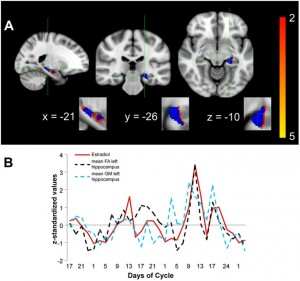As a female, I can attest to the fact that periods suck. They’re long, painful, cause emotional instability (PMS), and are overall a pain in the butt. While my health class in high school gave me a quick run around of what the menstrual cycle is internally and how hormones cause PMS, I still felt like I wasn’t completely knowledgeable on the process. After a little searching around on Google, this study entitled, Dynamics of the Human Hippocampus across the Menstrual Cycle, caught my eye. Published in Scientific Reports in August, this 2016 German study had previously seen a change in the size of the hippocampus of mice during menstruation and decided to see if the same results were true of human women. Since the focus of the study was to check if the hippocampus in women grew as it did in the mice, the study started with the null hypothesis that menstruation does not affect the size of the hippocampus and the alternative hypothesis that menstruation does affect the size of the hippocampus.
Researchers at the Max Planck Institute for Human Cognitive and Brain Sciences conducted this experiment by observing 30 menstruating women during two periods to see how their estrogen levels, the X variable, correlated to the size of their hippocampus, the Y variable. The team tracked each woman’s estrogen level while also studying MRI scans of her brain in order to see how the size of her hippocampus which, according to a medical report by Dr. Ananya Mandal, is a small part of the brain that controls ones emotions and long-term memory. After two weeks of following these women, the results of the experiment showed that the gray matter of the hippocampus did have a slight change in volume when estrogen levels were reported as higher than normal, adhering to the alternative hypothesis that menstruation does affect the size of the hippocampus.
While this picture added may be somewhat hard to figure, it depicts the correlation between estrogen levels and the size of the hippocampus’s measures in this experiment.
So now that we are aware that the hippocampus does grow, what does that mean in terms of how that affects the woman menstruating? Since it’s a common known fact that hormones affect mood and PMS, the results of the study basically just found another mechanism to tie the relationship between menstruating and PMS together; for when a woman is menstruating, her level of hormones increases which causes the hippocampus grow which then alters the woman’s emotional state, directly relating to what is known as PMS. These results also can be used as evidence to show how hormonal birth control can change the affects of PMS since the difference in monthly hormones caused by the pill or IUD change the amount of hormones which affect the way the hippocampus swell and subsequently how that affects a woman’s mood, energy, etc.
Even though this is only one study, I do belief that the findings make sense when compared to the PMS that almost every woman suffers from monthly. One of the only issues I found in this study was that the rate of estrogen each woman based on the time of her last period, which was self reported; And as Andrew has told us before memory is faulty. If I had conducted this study, I would have gone to farther lengths when tracking the levels of estrogen just to make sure I had the maximum amount of accuracy in my findings.
While I don’t believe that these findings are very surprising since almost everyone is aware of how a menstrual cycle affects women’s day-to-day lives, I do think it is interesting to see this new mechanism of brain swelling that relates the rise and fall of hormones to a woman’s mental state during menstruation.
Sources:
Scientific Report published study and photo source: http://www.nature.com/articles/srep32833
News Medical site: http://www.news-medical.net/health/Hippocampus-Functions.aspx


This is a really interesting topic! You did a good job at addressing the faults in the study and suggesting improvements. However, I feel that there have probably been more studies done on this relationship or ones similar to it that you could have incorporated into your blog. Your discussion of your topic using definitions from class made this easy to comprehend as well as interesting.
Obviously being a girl I can relate to this so I decided to read more into it. I found this article that shows even more effects that menstruation can have one the female brain. They didn’t mention the effects it has on the hippocampus but they talk about how PMSing effects our cognitive thinking which links back to the hippocampus. A 2010 study found that grey matter in the brain increases in regions involved with pain and decreases in other places. A later study found that cramp pains from menstruation have a negative effect on a women’s ability to preform tasks. This means that we struggle with attention based tasks. Overall we do not exaggerate the pain that comes with menstruation!! If you don’t believe it then read the article linked above.